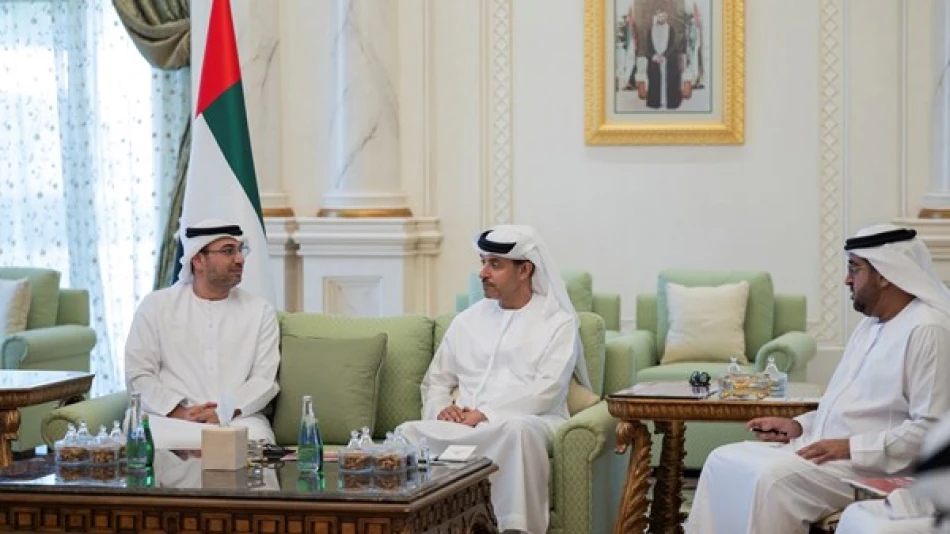
Sheikh Hazza bin Zayed Meets Union Railway Delegation to Discuss National Rail Network Developments in Al Ain
UAE's Railway Revolution: Al Ain Integration and Cross-Border Connectivity Set to Transform Regional Trade
The UAE is accelerating its ambitious national railway network expansion, with Al Ain poised to become a crucial hub connecting all seven emirates while establishing a groundbreaking rail link with Oman. Sheikh Hazza bin Zayed Al Nahyan recently reviewed comprehensive updates on these transformative infrastructure projects, which represent one of the Gulf's most significant transportation investments and could reshape regional logistics by 2026.
Al Ain's Strategic Railway Integration
During a high-level meeting with Etihad Rail executives, Sheikh Hazza bin Zayed Al Nahyan, the Ruler's Representative in Al Ain Region, examined detailed plans for connecting Al Ain to the broader UAE railway network. This integration forms part of the country's larger vision to create seamless inter-emirate connectivity, positioning Al Ain as a vital transportation node.
The timing is particularly significant as the UAE's freight rail services, which commenced operations in February 2023, have already demonstrated the network's potential. The upcoming passenger rail service, scheduled for 2026, will complete the transformation of how people and goods move across the Emirates.
Cross-Border Railway Partnership Takes Shape
Perhaps most notably, the UAE-Oman railway connection project entered its implementation phase in 2024, marking a historic milestone in Gulf Cooperation Council transportation integration. This cross-border initiative, developed through Hafeet Rail in partnership with Etihad Rail, Oman Rail, and Mubadala, represents the kind of regional connectivity that has long been envisioned but rarely executed.
The project mirrors successful international railway partnerships, such as the Channel Tunnel linking the UK and France, though adapted for the unique geographical and economic landscape of the Arabian Peninsula. Unlike Europe's passenger-focused cross-border rail networks, the UAE-Oman connection prioritizes freight and trade facilitation, reflecting the region's role as a global logistics hub.
Economic Implications and Investment Magnetism
From an investor perspective, these railway developments signal the UAE's commitment to diversifying its economy beyond oil dependency. The infrastructure investment creates multiple value streams: enhanced supply chain efficiency, reduced transportation costs, and improved regional trade flows.
Sheikh Hazza emphasized that the railway network will strengthen the UAE's position as a leading transportation hub while attracting additional investment opportunities. This aligns with broader economic diversification goals outlined in the UAE's long-term development strategies.
Regional Competitive Advantage
The UAE's railway expansion positions the country ahead of regional competitors in infrastructure development. While Saudi Arabia pursues its own ambitious railway projects, including the NEOM developments, the UAE's cross-border connectivity with Oman provides immediate regional integration benefits.
Singapore's success as a logistics hub demonstrates how strategic transportation infrastructure can multiply a country's economic influence beyond its geographical size. The UAE appears to be applying similar principles, using railway connectivity to cement its role as the Gulf's primary trade and logistics center.
Looking Ahead: 2026 and Beyond
The 2026 passenger service launch represents more than just transportation convenience—it signals the completion of a decade-long infrastructure transformation. The integration of freight services already operational with upcoming passenger capabilities creates a comprehensive transportation ecosystem.
For businesses and investors, the railway network promises reduced logistics costs, improved supply chain reliability, and enhanced market access across the UAE and into Oman. The project's emphasis on local expertise and national workforce development also suggests sustainable long-term operations rather than dependency on foreign technical support.
The railway network's success will likely influence similar infrastructure investments across the GCC, potentially creating a broader regional transportation revolution that could rival established logistics hubs in Asia and Europe.
Most Viewed News

 Layla Al Mansoori
Layla Al Mansoori






